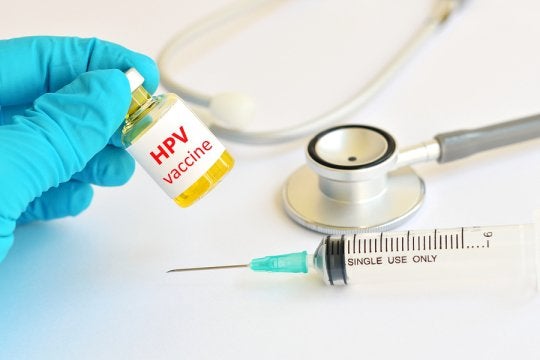-
Breaking Down Myths About HPV
HPV, or human papilloma virus, is the most common STD in the United States, but myths about the infection still persist. These misconceptions can be dangerous, since some of the strains of HPV are known to cause cancer. If you are sexually active, talk to your gynecologist about STD testing , including testing for HPV. Here are some myths about the virus that could be affecting your health.

Myth: HPV is a woman’s disease.
HPV infections occur in both men and women. The difference is how the disease is diagnosed. In women, HPV can be detected during a Pap test. For men, no FDA-approved diagnostic test exists. Because both men and women are at risk for HPV, many doctors recommend that both groups consider getting vaccinated, when possible.
Myth: I would know if I had HPV.
Not all STDs cause symptoms, and most people with HPV don’t experience any signs of the virus at all. In some people, genital and anal warts caused by HPV appear, but the symptoms are so rare that you cannot be confident that you are free of HPV simply because you are not experiencing any signs. Likewise, you cannot look at a partner and know if he or she has HPV. The strains of HPV that cause warts tend to have lower cancer risks than the strains that don’t cause any signs at all. The only way to know for sure if you have HPV is to ask your gynecologist to perform a test.
Myth: I can’t get HPV if my partner uses a condom.
HPV can be transmitted through skin-to-skin contact, so using a condom does not protect you from HPV. Because of the way HPV is transmitted, you can also contract it from having sexual contact without having intercourse. Condoms are essential for protecting you from other STDs, but HPV can be transmitted even if you have safe sex.
Your gynecologist in Washington, D.C. at Washington Surgi-Clinic can help you understand your risk for HPV and other STDs and recommend testing and STD treatment as needed. To make an appointment, please call (202) 659-9403.
-
A Look at the HPV Vaccine
Human papillomavirus, or HPV, refers to several hundred different types of viruses that can cause skin warts. Approximately 40 HPVs are considered to be sexually transmitted diseases, and of these 40, about 12 are linked with increased risks of different types of cancer. Many times, HPV doesn’t cause any symptoms, so infected people pass it on to their partners without even knowing they have it. Fortunately, the HPV vaccine is now available for young girls and boys and can dramatically decrease future cancer risks for those who receive it. A gynecologist can help you determine if the vaccine is right for your child. These facts will also help.

What is the HPV vaccine?
The HPV vaccine provides protection against four types of sexually transmitted HPV, including those types responsible for approximately 70% of cervical cancer cases and 90% of cases of genital warts. The vaccine also protects against HPV strains that are associated with anal, vaginal, vulvar, penile, and oropharyngeal cancers. HPV vaccines are inactivated, which means that no live viruses are included in the vaccine.
Who should get the vaccine?
For girls, the HPV vaccine should be administered before they become sexually active, so that there is no risk of them having the virus already. A pediatrician or gynecologist may recommend giving the virus to girls between ages 11 and 12, but it is safe for girls as young as nine. Boys can receive a version of the vaccine, called HPV4, between ages nine and 26.
What are the benefits?
The HPV vaccine is not a type of contraception and does not encourage sexual activity, which are fears some parents have. The vaccine simply prevents infections when recipients do become sexually active that could later turn into cancer. According to the American Cancer Institute , nearly all cases of cervical cancer, 95% of anal cancer cases, and 65% of vaginal cancer cases are caused by HPV infections, and a vast majority of these cases could be prevented by the HPV vaccine.
Make an appointment at Washington Surgi-Clinic if you have questions about the HPV vaccine, STD testing, and HPV treatment in Washington, D.C. Please call (202) 659-9403 to schedule your visit.
-
Inform Yourself about HPV
Human papillomavirus, or HPV, affects at least half of sexually active people. There are over 100 different strains of the virus, and while some clear up on their own without causing symptoms or complications, others are linked to cancer. Your gynecologist can determine if you are at risk for HPV and i`f you need to be tested for the virus. Here are the facts you need to know.

How Does HPV Spread?
HPV is spread through sexual contact. You can catch it by coming into contact with the genital skin, mucous membranes, or bodily fluids of an infected person during sexual intercourse or oral sex. HPV generally doesn’t cause any symptoms, so you usually cannot tell if someone has it by looking at them; many people who are infected don’t know that they carry the virus. The only visible symptom of HPV is genital warts, which may appear alone or in clusters.
How Is HPV Diagnosed?
Many cases of HPV go undiagnosed because they clear up on their own without causing any symptoms. If genital warts are present, your gynecologist can diagnose HPV with a visual exam. In some cases, your gynecologist may recommend an HPV test, which can be performed during your Pap smear. HPV tests are usually not recommended for women under 30 unless there is a reason, such as an abnormal Pap test result.
How Can I Reduce My Risk of Getting HPV?
Abstaining from sexual contact is the only way to completely avoid HPV. You can reduce your risk of contracting it by using a condom and limiting your number of sexual partners. Choosing sexual partners who have also limited their own number of partners in the past will also reduce your risk.
If you are concerned about HPV, make an appointment at Washington Surgi-Clinic. We provide gynecology services near Washington, DC, including STD testing . You can schedule an appointment now by calling (202) 659-9403.
-
What Women with HPV Should Know
The human papilloma virus (HPV) includes over 150 different virus types, more than 40 of which can infect the genital region. HPV is a very common type of sexually transmitted infection (STI) that may be transmitted through oral, vaginal, or anal intercourse. Having HPV can be associated with a higher risk of cervical cancer. If you have tested positive for HPV, your gynecologist can help you understand its possible effects on your health and your HPV treatment options.

Normal Monitoring
An HPV infection doesn’t always require treatment. If you tested positive for HPV, yet your Pap smear was normal, your gynecologist may recommend having these tests again in one year. Quite often, women who test again in 12 months do not show signs of pre-cancerous changes or HPV. If this is the case for you, your gynecologist may instruct you to resume your normal testing schedule.
Additional Testing
If you tested positive for HPV and your Pap test results were abnormal, your gynecologist may recommend that you undergo additional tests. Your doctor may perform a colposcopy, which allows him or her to examine the cervix through magnification. Your doctor might also recommend a tissue biopsy. Depending on the results of the additional tests, you may be referred to a gynecologic oncologist.
HPV Treatment
It is not possible to treat the virus itself, as there is no cure. However, a gynecologist can recommend treatment options for problems caused by the virus . Your gynecologist can treat genital warts, for example. He or she might also recommend the removal of the abnormal cervical cells to prevent them from becoming cancerous later on. Your gynecologist may remove these cells during a colposcopy. Other methods of removing abnormal cells include cryotherapy and loop electrosurgical excision procedures (LEEP).
For HPV treatment in Washington, D.C., women can rely on the compassionate gynecology team at Washington Surgi-Clinic. Our gynecology practice provides comprehensive well-woman services, including first and second trimester abortion options, STD testing, and Pap smears. Call (202) 659-9403 for an appointment.
-
Get the Facts on HPV
There are more than 100 different types of human papilloma virus (HPV). HPV is so prevalent that almost every man and woman who is sexually active will contract at least one form of the virus at some point. Some types of HPV can cause serious health problems, while others are relatively benign and may not even cause symptoms. Since everyone who is sexually active is at risk of contracting HPV, it’s a good idea to consult a gynecologist about its risks and, if necessary, HPV treatment .

Identifying the Health Risks of HPV
Often, HPV does not cause any health problems and it can go away on its own. Other people experience health problems from HPV, such as genital warts, and oral and upper respiratory lesions. Additionally, certain types of cancer may be caused by HPV infection. In fact, most cases of cervical cancer are attributable to just two types of HPV, which are not the same types that cause genital warts. These forms of HPV can also cause oropharyngeal, penile, anal, vaginal, and vulvar cancers. An individual with HPV may be more likely to develop health problems, including cancer, if he or she has a suppressed immune system.
Reducing Your Risk of Acquiring HPV
You can talk to your gynecologist about reducing your risk of HPV . It’s highly advisable to use latex condoms during sexual intercourse, even if you’re using another birth control method such as the pill. However, be aware that HPV can infect areas of the body other than the reproductive organs. Being in a monogamous relationship can also lower the risk. Additionally, gynecologists urge males and females to get vaccinated for the types of HPV that can cause cancer. The HPV vaccine is indicated for boys and girls who are 11 to 12 years of age, and for men up to 21 years of age and women up to 26 years of age.
Women who require HPV treatment in Washington, D.C. can turn to Washington Surgi-Clinic for compassionate, confidential care. Our highly qualified gynecology team provides an array of women’s health services, including pregnancy termination. If you have any questions, call (202) 683-7336 and speak with a friendly staff member.
Recent Posts
Popular Posts
categories
- Uncategorized
- STD
- Washington Surgi-Clinic
- Abortion
- Pregnancy
- Pap Smears
- Birth Control Options
- HPV
- Gynecologist
- Pregnancy Test
- Abortion Safety
- IUD
- Pregnancy Termination
- First Trimister
- Cervical Cancer
- Morning After Pill
- Birth Control Pills
- Chlamydia
- Birth Control Shot
- Gonorrhea
- STD Testing
- Birth Control Implant
- Pelvic Pain
- Birth Control Patch
- HIV
- HPV Vaccine
